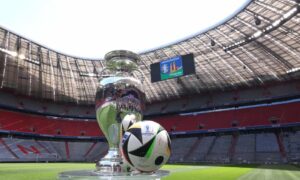
“We will be United In The Heart Of Europe. Over four weeks.” Looking back, it was probably wise of Uefa’s president, Aleksander Ceferin, to add that neat little disclaimer while announcing the official slogan of Euro 2024, to dial back just a touch the tournament’s contractual peace, love and unity obligations.
Three years on from the big unveil in Munich, Uefa is still out there shunning (some) despots, eradicating intolerance everywhere (apart from in major European football leagues) and reaching out with a single trembling hand, Michael Jackson-style, to lower the rifle barrel of the nearest infantryman. But only, let’s be clear on this, for the next four weeks. And we will have to insist everyone promises to keep their eyes fixed on the screen and closes their ears to the noises through the wall.
Six years and 239 qualifying matches in the making, carbon-light but still undeniably grand, Euro 2024 is finally upon us. And it is hard not to drool just a little at the prospect of 51 games in 31 days, a stage for eight of the top-10-ranked teams in the world, to lose yourself in the sound and light of a proper, non-plague-ridden European Championship for the first time since France 2016.
The draw looks open, with at least five plausible winners in France, Portugal, Spain, England and the hosts. Germany remains a classic rock-’n’-roll-years host nation. A visibly delighted John McGinn has been pictured dancing to oompah music alongside smiling people in traditional Bavarian costume, described by the assistant manager, John Carver, as “joining in with the culture”, with a sense of nostalgic yearning about the whole tableau, like a Shoot magazine feature from 1982. After the ersatz exercise that was the Euros of Everywhere, this all feels pretty real.
For now anyway. Like every other global sporting beano, there is a sense, too, of ghosts at the edge of the picture, of the world shifting uncomfortably around this thing. We may, as Ceferin points out, be in the heart of Europe. But those tectonic plates continue to grind.
It is worth remembering political flux is a part of the heritage of the European Championship. This is a tournament forged around the wider urge for post-war European stability, the notion of football as an arm of international relations. The first edition in 1960 was won by the USSR, helped by a walkover after fascist Spain refused to travel to a communist country. Euro 88, the last one in West Germany, still feels indissolubly bound up with perestroika, the fall of the wall, Gorbachev and Reagan, the phrase “that was a different time”.
